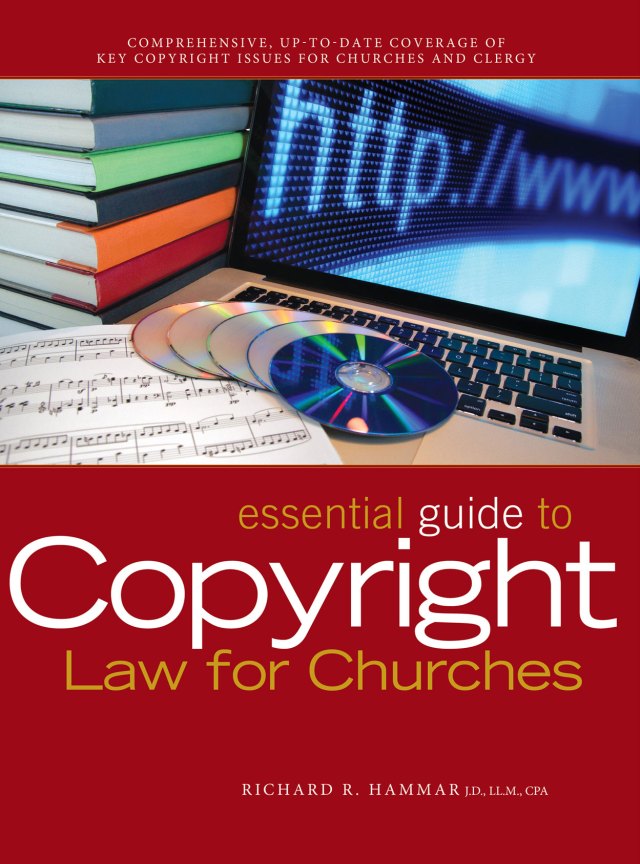Many worship songwriters write with the hope that their songs will be used within the Body of Christ to glorify God for generations. Take Hillsong’s “Mighty to Save,” for example: The melody is compelling enough to be played by a stadium band with six electric guitarists, pads, and loops, but it’s simple enough to be played by one person at a piano or on a guitar.
Ben Fielding and Reuben Morgan wrote this song to be accessible and easy to sing in these various contexts. Some Christians might think, With this outward purpose in mind, isn’t it selfish that an author would want credit for a song, when it’s all for God’s glory? Using this logic, however, Christian book authors would always go by pseudonyms. Blogs would be anonymous. Art pieces would belong to faceless artists.
Understanding music copyright issues in a church setting is challenging. The laws are complicated to understand, and even tougher to follow. As a worship leader, I’ve seen churches approach this issue both legally and illegally. My church takes great care to follow copyright laws, primarily by displaying the correct information for each song we sing in worship—and by making certain we’ve properly paid for the use. However, I’ve visited some other churches that, either through ignorance or choice, do not follow copyright law at all.
As Christ-followers working to put together a church service, we understand that following copyright law is important, but we might not always grasp exactly why, or who benefits. Once that’s understood, the task of creating legal and ethical worship services can seem like a daunting task. Nevertheless, this is a matter worthy of your time.
Why does it matter?
The legal processes in music copyright law protect the artists we appreciate every week. They ensure that these artists can keep writing, recording, and supporting their craft. In Romans 13:7, Paul says, “Pay to all what is owed to them: taxes to whom taxes are owed, revenue to whom revenue is owed, respect to whom respect is owed, honor to whom honor is owed.” This pertains to those in music ministry as well—after all, if they don’t get paid to do their jobs for a living, they may not be able to do it at all.
Abiding by copyright laws also protects our churches because choosing to ignore these laws can leave our churches vulnerable to myriad legal issues. Following copyright laws is a matter of love, integrity, and stewardship. So how do you do it?
Copyright rules
Copyright law is not simple, even for a seasoned worship leader. One worship pastor told me, “Some of the biggest issues that I have come across, and seen in other churches, [are] understanding exactly what you are licensing. In ministry, a lot of the time it feels like you’re just trying to plug a hole in a boat with your finger and row to shore at the same time, so it’s no wonder why there is so much confusion on these topics. Worship pastors simply don’t have the time (and certainly don’t prioritize the energy) to understand all the licenses they need to accomplish the vision of their ministry.”
So how can churches abide by the law without hiring a full-time staff member just to navigate these overwhelming issues? Here are three primary ways churches encounter music copyright law issues:
1. Displaying lyrics in worship
It is simply illegal to display copyrighted lyrics without a license. Anything that doesn’t fit under public domain (such as certain hymns) falls into this category. Fortunately, there are several large companies that take the legwork out of these processes. Overall, this is the easiest and most time-efficient option for churches. Without the “middleman,” churches would have to individually contact each song publisher to obtain a license. Instead, churches can buy different types of licenses that gives them rights to display lyrics and access thousands of lead sheets (the melody and lyrics) and song charts (just the chords) for their musicians to use.
The largest licensing option is Christian Copyright Licensing International (CCLI). Other licensing companies include One License and WORSHIPcast (created by Christian Copyright Solutions). You’ll find additional information, along with various pricing packages, on the sites of three licensing companies mentioned here.
Regardless of which licensing option churches use, they aren’t bound to one particular way of displaying lyrics in a worship service. Some put the information on every slide. This can become distracting, so it’s also possible to include all the information on a slide at the end of the service. Or, if a church distributes bulletins, the information may also be included there. Regardless of the approach, the copyright information will basically look like this:
“Our God Lives,” words and music by John Doe
© 2010 Good Music Co.
Used By Permission. CCLI License #______________
2. Getting music to your team
Unlike displaying lyrics for all songs, this issue is less straightforward. In my experience, worship pastors use a number of methods for getting recordings to their team members, some of them illegal (like burning and sending mp3s). There are a few ways to ensure a legal process:
Spotify. Spotify—and other free programs like it—is changing the way we listen to and share music. Worship leaders can give their team the titles and artists of songs, and the worship team members, after downloading Spotify, can go directly there to listen. Better yet, users can create and share playlists, making this an extremely easy way to share new music.
iTunes Store. If worship leaders want their team members to keep the music they’re working on (rather than watch or listen to it without ownership), they can easily “gift” songs to several people through the iTunes Store. This is easily accessible on an Apple device or on any computer.
YouTube. This is perhaps the easiest option because anyone can quickly listen to a song. However, it can be tricky to find a quality version, and if a church does more obscure songs, worship leaders might be better off looking elsewhere.
Recording. This may be a more difficult option for some. Depending on the license your church secures, it may be legal to record a service and give it to 15 percent of your church congregation. You will need to ask licensing companies about this.
Any of these options can be communicated via e-mail, or by using a planning tool, such as Planning Center, which offers a centralized place to share, upload, and learn new music.
3. Selling music
Through a CCLI license, churches are permitted to record and sell audio and video of services, including worship music. But if they’re going to include copyrighted music on the CD or DVD, there are a few limitations. Again, as with the recording rule above, they cannot sell more copies per year than their reported church size, and no more than 15 percent of their church attendees at each service may receive recordings without additional payment. Churches should talk to licensing companies about how much they may charge per CD or DVD, to cover the costs.
There are other issues that churches may encounter with copyright law, but these are some of the most common questions. Churches who intentionally seek to obey these laws will protect not only their reputation, but their congregation. And just like the songs we sing, this diligence is an act of worship.
For more information on copyright, check out our Essential Guide to Copyright Law for Churches.





